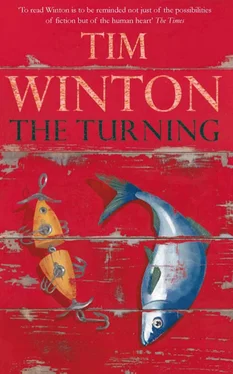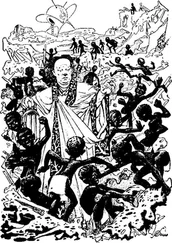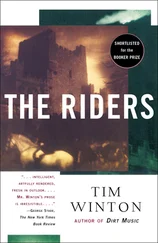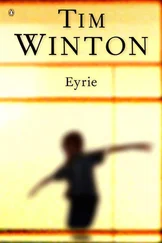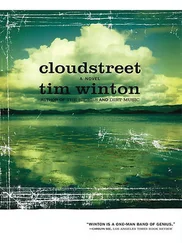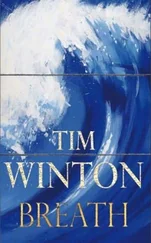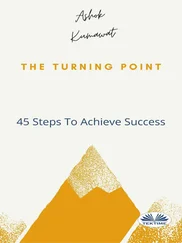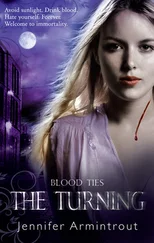The visits were always difficult. The place itself was quiet and orderly but Boner was a wild, twisted little man; an ancient child, fat and revolting. And of course I was busy. The import business had become my own when I bought Ethna out. I travelled a lot. I sold my house and the weekender at Eagle Bay and bought a Kharmann Ghia and an old pearling lugger. I lived on the boat in the marina and told myself that I could cast off at a moment’s notice. I would not be cowed by middle age; I was my own woman. And I valued my equilibrium. I didn’t need the turmoil of seeing Boner McPharlin more than once a year.
This year, on New Year’s Day, I wheeled Boner out among the roses and he slumped in the chair, slit-eyed and watchful, and before we got to the tree that provoked his usual spiel about his mother’s screaming neck, he began to whisper.
Santa’s helpers came early for Christmas.
What’s that? I said distractedly. I was hungover and going through the motions.
Four of the cunts. Same four, same cunts.
Boner, I said. Don’t be gross.
Cunts are scared. Came by all scared. Big red, he’s lost his hair. Frightened I’ll dog him. Fuckin cunts, every one of em. Come in here like that. Fuckin think they are?
Someone visited? I asked.
Santa’s helpers.
Did you know them?
Wouldn’t they like to know? he said with a wheezy giggle.
I stopped pushing him a moment. The light was blinding. Already his hair hung in sweaty strings on his neck. The sunlight caused him to squint and he licked his cracked lips in a repulsive involuntary cycle. There were scars in his earlobes where he’d torn his earrings out years before. Despite the heat he insisted on a blanket for his legs.
So, did you? I asked. Know them, I mean.
You put me here, he said.
I’m your friend.
Friend be fucked.
Your only friend, Boner.
You see that tree? You see that tree? That tree? That’s my mother’s screamin neck.
Yes, you’ve told me.
Screamin neck, not a sound. You can hang me from that tree, I don’t care, you and them can hang me, I don’t care.
Stop it.
Let em do it, let em see, the pack a cunts. Never know when I might bite, eh. Even when I’m dead. Shark’ll still go you when you think he’s dead.
Happy New Year, Boner.
Get me out, Jack. Let’s piss off.
You are out. See, we’re in the courtyard.
Out! Out , you stupid bitch.
I’m going now.
You’re old, he said mildly. You used to be pretty.
That’s enough.
They said it, not me.
I have to go.
See if I fuckin care.
I really have to leave.
Well it’s not fuckin right. I never said a word. Never once.
Boner, I can’t stay.
Just drivin, that’s all I did. Never touched anythin, anybody, and never said a word — Jesus!
I’ll turn you around.
Please, Jackie. Let’s ride, let’s just arc it up and go.
Both of us were crying when I wheeled him into the darkness of the ward. He slumped in the chair. I left him there.
A week later he was dead. The hospital told me it was a massive heart attack. I didn’t press for details. Looking back I see that I never did, not once.
There were six of us at the cremation — a nurse, four men and me. Nobody spoke but the priest. I didn’t hear a word that was said. I was too busy staring at those men. They were older of course, but I knew they were the cops from back home. There was the neat one in the good suit who’d called me about Boner’s breakdown. Two others whose faces were familiar. And the tall redhead who’d asked to see my arms when I was sixteen years old. His hair was faded, receding, his eyes still watchful.
I began to weep. I thought of Boner’s fire, his twisted bones, his terrible silence. I got a hold of myself but during the committal, as the coffin sank, the sigh I let out was almost a moan. The sound of recognition, the sound of too late.
I walked out. The redheaded detective intercepted me on the steps. The others hung back in the shade of the crematorium.
My condolences, Jackie, he purred. I know you were his only friend.
He didn’t have any friends, I said, stepping round him. You should know that, you bastard — you made sure of it.
I’m retired now, he said.
Congratulations, I said as I pushed away.
I drove around the river past my office and showrooms and went on down to the harbour. I cruised along the wharf a way and then along the mole to where the river surged out into the sea. I parked. The summer sun drove down but I was shivery.
The talk on the radio was all about the endless Royal Commission. I snapped it off and laid my cheek against the hot window.
I didn’t see it whole yet — it was too early for the paranoia and second-guessing to set in — but I could feel things change shape around me. My life, my history, the sense I had of my self, were no longer solid.
All I knew was this, that I hadn’t been Boner’s friend at all. Hadn’t been for years. A friend paid attention, showed a modicum of curiosity, made a bit of an effort. A friend didn’t believe the worst without checking. A friend didn’t keep her eyes shut and walk away. Just the outline now, but I was beginning to see.
They’d turned me. They played with me, set me against him to isolate him completely. Boner was their creature. All that driving, the silence, the leeway, it had to be drugs. He was driving their smack. Or something. Whatever it was he was their creature and they broke him.
I sat in the car beneath the lighthouse and thought of how I’d looked on and seen nothing. I was no different to my parents. Yet I always believed I’d come so far, surpassed so much. At fifteen I would have annihilated myself for love, but over the years something had happened, something I hadn’t bothered to notice, as though in all that leaving, in the rush to outgrow the small-town girl I was, I’d left more of myself behind than the journey required.
THERE WAS THE BOY I LIKED. It was the war that made me think of him and the time we rode south together on the train, in the days when the trains still ran. He sat right up the front of the carriage in an army uniform. He was alone. His hair was so long that it hung out of his beret like Che Guevara’s. The boots and webbing, the stripes on his arm, they looked incongruous. He was fifteen years old.
It took me three hours to work up the nerve to go and sit beside him. Although it was the last day of the holidays the carriage wasn’t even half full. There were some old people, a couple of kids in batik shirts and a few other rowdy boys in khaki who I had to pass on my way down the aisle. When I plumped down beside him he looked up from his book a moment and smiled politely. He smelled of starch — yes, of Juicy Fruit and Fabulon.
He went back to reading with a solemn expression. The book was something called Saturday Night and Sunday Morning.
Any good? I asked.
Nah, he said. Kinda boring.
What’s with the uniform?
Cadet camp, he said. We were up at Northam.
Oh. How was it?
Hot as buggery. In winter it’s worse. Tin barracks, camp stretchers, awful food.
Geez, I said. Sounds grouse.
We rode along without talking for a while. It was kind of awkward. He was by the window and when I looked out at the paddocks and the hills and the dry January bushland rolling by, it must have seemed like I was staring at him.
What? he said, half-grinning.
The uniform and everything. The army stuff. I don’t get it.
He shrugged.
We’re out of Vietnam now, I said.
Lucky us.
I mean, didn’t you worry? That they might send you?
I’m at school, he said.
Читать дальше
